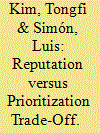| Srl | Item |
| 1 |
ID:
189875


|
|
|
|
|
| Summary/Abstract |
This article introduces the ‘deterrence failure’ concept and applies it to North Korea’s nuclear threat situation. For this purpose, it selects five factors, including retaliation posture; credibility of retaliation; probability of the challenger’s success; challenger’s irrational leader; and situational desperateness, to evaluate the US–South Korea nuclear deterrence posture against North Korea. Except for the retaliation posture, most factors are very concerning. Therefore, to strengthen their deterrence posture against North Korea, the United States and South Korea should take a few practical measures to ensure the implementation of the US extended deterrence, including the forward-deployment of more US retaliation assets around the Korean Peninsula.
|
|
|
|
|
|
|
|
|
|
|
|
|
|
|
|
| 2 |
ID:
184244


|
|
|
|
|
| Summary/Abstract |
Under what circumstances is a protégé likely to perceive its patron’s extended deterrence commitments in another region as positive or negative for its own security? Protégés from distant regions see complementary reputational links between the credibility of a patron’s extended deterrence commitments in each other’s region. However, they are in a competitive relationship when it comes to the allocation of the patron’s resources. We call this the reputation versus prioritization trade-off. We argue that whether protégés assign more importance to their patron’s reputation or to being prioritized by said patron is a function of their dynamic perceptions of their regional security environment. These are, in turn, determined by their perception of their patron’s resource constraints and the threat posed by an adversary. To test our argument, we examine how Japan has perceived America’s evolving security commitment in Europe and how Poland has perceived the evolving US commitment in Asia.
|
|
|
|
|
|
|
|
|
|
|
|
|
|
|
|